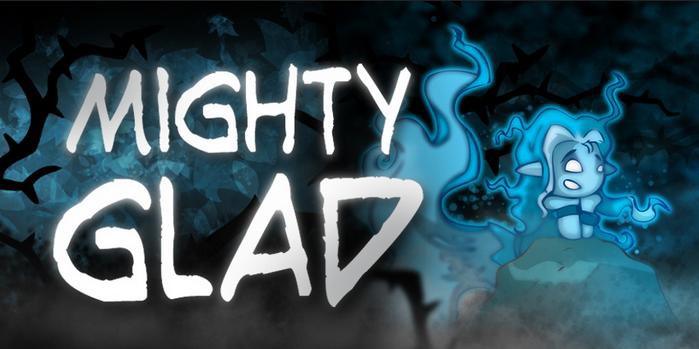This webcomic review takes a look at A-verse Comics’ series on Tapastic.com. Here’s a short blurb that describes what Mighty Glad is all about…
A lost and amnesic Gladiator “Glad” with the help of his snarky guide, “Verah”, must battle their way through an unforgiving land of beasts to return home.
FIRST IMPRESSIONS
I have to say that I had some pretty high expectations when starting this comic—mostly because the very first lines of this comic immediately reminded me of Dante’s Inferno (the epic poem, not the game). Just like in the poem, the main hero of this comic, Glad, finds himself lost in the woods. And pretty much exactly like Dante Alighieri’s The Divine Comedy, Glad here also has a kind of spirit guide in Verah Virgilious (the name itself is already an obvious reference to the poet Virgil).
Of course, because Glad is a gladiator, and not a 14th century poet, I started to wonder at some point whether the creators of this comic built their idea for this comic off of the Dante’s Inferno video game. Even if they did, though, you can be pretty sure that it’s a pretty different experience from both the epic poem, and the video game.
For one thing, the comic is definitely a comedy—a kind of slapstick comedy to be even more specific. It has a couple of funny moments, and reads and looks like it’s targeted towards kids. In fact, the artist’s style is exactly what makes the somewhat dark and dreary colors of this comic a bit more lively and fun.
But for all the 30+ pages of this series already posted on Tapastic, here’s what I have to say:
It’s not enough for me to go on.
Because while there are indeed more than thirty pages of Mighty Glad already published, many of those pages have between one to three panels. So in essence, there’s not really much to go on, or comment on when it comes to story.
Still, because they requested a review, let me at least say a couple of things about what I noticed so far about Mighty Glad.
STORY DIRECTION & FOCUS
Perhaps the biggest—and most important—questions I have regarding this comic are these: “Where is it going?” and “What’s it about?”
Because even while it seems like a fun read, it hasn’t given me (personally) any reason to stick around. After thirty-five pages, all we’ve established about this world is that Glad, Verah, and Hopelis are all wandering around this dark wood—and they are, what Verah calls, “Mighties”.
In thirty-five pages, we’re presented with strange creature after strange creature, but we’re given no information about where we are, what’s going on, and what these characters really want.
Sure, Glad seeks a way out of the woods. But the kind of “want” I’m talking about is that deep character goal. Because every epic hero essentially has one. The question is, what is Glad’s?
The purpose of every first Act of a story is to establish the world and the characters. The world was pretty much established already when Glad encountered that first monster. Now, what about the characters?
CHARACTER GOALS & DISTINCTIONS
In his book, Save the Cat, Blake Snyder talks about one important scene that many modern day Hollywood movies seem to miss: the save the cat scene. This is a scene wherein the audience is introduced to the main character in such a way that the audience can immediately relate to him or her.
In other words, the best way that you can get your audience to immediately love and relate to your characters is to present something about them that is human.
Blake Snyder’s own example is when the hero literally saves the helpless cat. But there are a ton of movies out there where if you pay close attention, you should be able to pinpoint the exact moment when you began to feel more invested towards them.
In Finding Nemo, for example, the reason you aren’t completely annoyed by Marlin’s over-protectiveness is because we were first shown the reason for it: the loss of nearly his entire family. We, the audience, instantly relate to that because at some point in our lives, we’ve all experienced loss.
In Gattaca the main character, Vincent, is shown as someone the world looks down upon—because of the simple fact that he wasn’t genetically engineered and enhanced like most children born in their society. How many of us have had that experience of not being taken seriously? Of being demeaned and ridiculed?
Of course, Mighty Glad is mainly a funny comic, but stories can be both resonant and funny at the same time. Everything Pixar comes up with, for example, is like that.
CONCLUSION
Ultimately, I believe that while A-verse comics did fit my criteria of having at least thirty pages finished and uploaded, their thirty pages wasn’t exactly enough to get a more thorough review of the beginning of this comic—mostly because some of these pages contained between one to three panels.
So despite having thirty plus pages published, I can’t exactly do this review much justice because Mighty Glad’s story hasn’t even started yet, to be honest.
To conclude, then, consider this webcomic review as more of feedback on first impressions. I’ll try to get back to it in the future, when more pages have been posted, and more of the story has unfolded.







